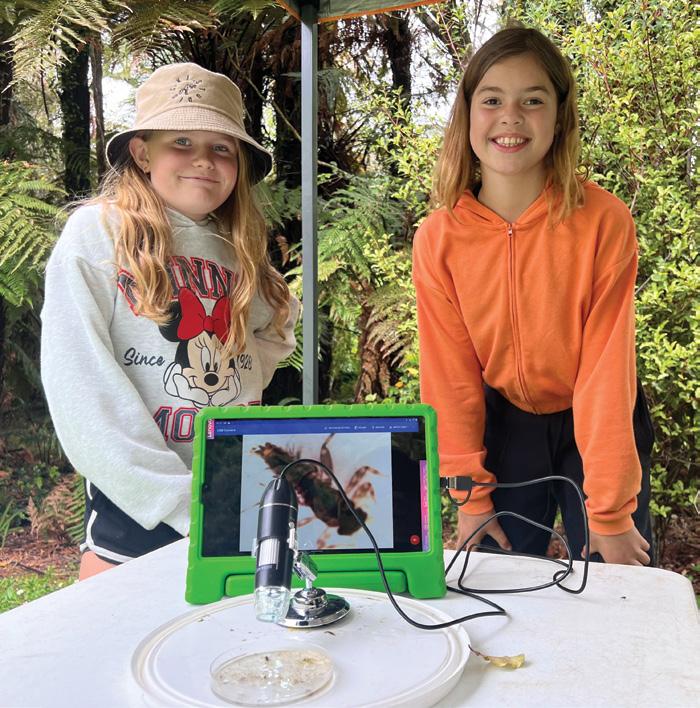
5 minute read
Nature Education Programme
Fostering Wonder & Empowering A New Generation!
When Bay Conservation Alliance (BCA) was set up in 2017, they sent a survey to the original four member groups to learn more about them and some of the common challenges they faced. The intention was to set up systems to support them in these areas.
One challenge was supplying conservation education into schools. Some groups already offered education to schools, with volunteers delivering the programmes, but due to the nature of volunteer support, funding challenges and limited available resources they often found it difficult to consistently deliver their programmes.
What was needed was funding for a dedicated paid educator and the creation of a targeted education programme using combined resources that was structured for long term use. This resulted in BCA running education programmes on behalf of two of the member groups: the Ōtanewainuku Kiwi Trust and Aongatete Forest Project with original funding from the Bay of Plenty Regional Council and Acorn Foundation. As demand grew Ballance Agri-Nutrients came on board as a corporate sponsor enabling more students to benefit.
In 2021 BCA received funding from Western Bay of Plenty District Council to run a different programme targeting seven schools in the district. BCA set up a broader Nature Education Programme, aligned with the MOWS education programme and runs this alongside the programmes for Ōtanewainuku Kiwi Trust and Aongatete Forest Project.
The Overall Goal
The programme has been set up with great thought into how best to work with schools and students. The aim is to equip and empower the new generation to not only mentally care for the natural world around them, but also have knowledge of how they can make a difference, and desire to put that knowledge into action.
So, although each module has classroom time that sets the unit’s learning foundation, it’s the day in the field that brings it to life. Nature, when given the opportunity, works its magic within a child, and an adult!
Free Explore
BCA’s Education & Engagement Manager Janie Stevenson explained that during field trips they include time for students to freely explore. This time can help cement some of the new learnings from the module, giving them the opportunity to explore, discover, question, and look for answers in their own time.
It may be the first time they have been in a particular environment, or - with their new-found knowledge - it may be the time they need to feel a connection to the land. New questions that arise during these times are often learning opportunities for many, including the adults. It is an opportunity to expand on what is taught in a module which are tweaked and improved each year.
Service To The Community
Most units include some type of volunteer work. Janie said that service to the community is an important element of our programme. Children are growing up in an environmentally challenged world which for them, may feel overwhelming at times. Taking part in community service fosters empowerment and helps them understand that they can be part of the solution and they can make a difference, starting today! This can lead to students, as well as schools, making a difference in their area. Some may go on to join or create local environmental groups or start conversations about caring about their community with friends, family, or iwi.
EMPOWERMENT TO ACT
The hope is also that students understand the power of their voice and use it when environmental decisions are being made. The other hope is that teachers, seeing how the programme is run, are inspired, and empowered with confidence to use the programme as a foundation to create their own modules, using local areas for field work.
One of the challenges for teachers of students in years seven and eight is being able to get release time for field trips. By recognising and incorporating learning opportunities from other curriculum areas in modules, learning outcomes are even better! Seeing the value of this will hopefully mean release time becomes less of an issue.
FEEDBACK:
Te Puna School: Students loved the water testing and bugs and overall found the trip really useful. Lots of good discussion in class afterwards. We loved that it was hands-on, and all the kids got to experience every aspect.
Pahoia School: All the students said that the trip was well worth doing and that they learnt a lot during the day. They said they felt that they’d contributed to helping the dunes survive.
Katikati College: The highlight for the students was the planting, because it was interactive and the trapping because it was interesting to learn about the animals, not just why we need to remove them.
Ōmokoroa Point School: The students had a great day and were very engaged in the activities. Some of their highlights were the bush walk, using binoculars to look for birds, identifying the birds’ calls, learning about insects and exploring the bush around the Burma trail.
Te Ākau ki Pāpāmoa: We are going to look at Te Āra ō Wairakei by our Kura, and doing similar investigations to bring awareness to this area and see how we can help to keep restoring the mauri of this area and our role as kaitiaki.
Get in touch! Please get in touch for more information by emailing: education@bayconservation.nz











